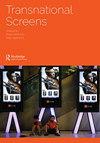Bring on The Parade: queer cinema, memories of war and transnationalism in Srđan Dragojević’s Parada (2011)
IF 0.4
0 FILM, RADIO, TELEVISION
引用次数: 0
Abstract
ABSTRACT This article examines Srđan Dragojević’s film The Parade (Parada), a co-production between Serbia, Croatia, North Macedonia, Monte Negro, Slovenia and the Council of Europe, analysing how it engages with both queer rights and nationalist memory narratives. The Parade was released in 2011, a year after an anti-gay riot led to more than 100 people being injured at Belgrade Pride. In spite of these events, Dragojević’s comedy-drama and its depiction of an unlikely friendship between a homophobic criminal and a gay veterinarian became a box-office hit both in Serbia and in neighbouring countries. This popularity is all the more interesting due to how the film depicts not only LGBTQI activism, but also the history of the break-up of Yugoslavia and the question of transnational solidarity. In doing so, The Parade is emblematic of other queer films produced in the region, with works such as the Croatian Fine Dead Girls and The Constitution, the Bosnian Go West and the Slovenian Guardian of the Frontier also thematising homophobic prejudice in conjunction with nationalism and memories of war. Drawing on this, this article examines how The Parade and other films in the region such as Rajko Grlić’s The Constitution address queer identity, memory and (trans)nationalism.带来游行:酷儿电影、战争记忆和跨民族主义在Srđan dragojeviki的Parada (2011)
本文考察了Srđan德拉戈耶维奇的电影《游行》(Parada),这部由塞尔维亚、克罗地亚、北马其顿、黑山、斯洛文尼亚和欧洲委员会联合制作的电影,分析了它是如何与酷儿权利和民族主义记忆叙事结合在一起的。游行于2011年发布,一年前,贝尔格莱德的反同性恋暴乱导致100多人受伤。尽管发生了这些事件,德拉戈耶维奇的这部喜剧,以及它对同性恋罪犯和同性恋兽医之间不太可能的友谊的描述,在塞尔维亚和邻国都取得了票房上的成功。这部电影不仅描绘了LGBTQI的活动,还描绘了南斯拉夫解体的历史和跨国团结的问题,因此这部电影的受欢迎程度变得更加有趣。因此,《游行》是该地区其他酷儿电影的象征,克罗地亚的《好死女孩》和《宪法》、波斯尼亚的《向西走》和斯洛文尼亚的《边境守护者》等作品都将同性恋偏见与民族主义和战争记忆结合在一起。在此基础上,本文检视《游行》与该地区其他影片(如Rajko grliki的《宪法》)如何处理酷儿身份认同、记忆与(跨性别)民族主义。
本文章由计算机程序翻译,如有差异,请以英文原文为准。
求助全文
约1分钟内获得全文
求助全文
来源期刊

Transnational Screens
Arts and Humanities-Visual Arts and Performing Arts
CiteScore
0.60
自引率
0.00%
发文量
23
 求助内容:
求助内容: 应助结果提醒方式:
应助结果提醒方式:


